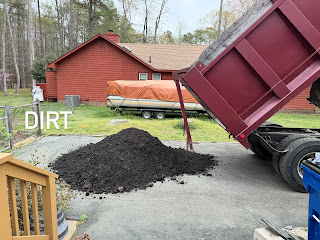Vegetables with Passports
These okra have accumulated frequent flyer miles to get here, only to be pickled in their prime. They're from Nicaragua, where it's late fall, perfect okra season. Outside, in our garden--photos tomorrow--greens are bolting, but everything else is waiting to be put in the ground after the last danger of frost. Some things have gone in: root vegetables, onion sets, peas. My job as Preservationist is to take what's ripe at it's perfect time and preserve it for when we most long for it. It goes against my grain to do this, pickle Nicaraguan okra, but our chefs are asked to cook all over the country, and they like to take foods indicative of the south with them. I don't blame them for their eagerness to spread the love of Southern food and culture, but I am certainly going to make sure that this year, I pickle enough okra and make enough Chow Chow to get them through their winter travels!
I taught a class yesterday to a delightful woman from Kentucky who grew up canning with her mother, something I didn't do. She could have taught me many lessons, I'm sure. When I found out she'd grown up in Florida making strawberry jam, and her children grew up making the same with her, I felt foolish for my lesson plan of making it, too! So, we dutifully made the jam, then started some Spring Thyme Marmalade. Today, we'll finish it, picking thyme from the herb garden outside the larder door.
Here's my pickled okra recipe, but I need to make everyone promise they will not make this until okra are really, truly in season! Promise?
PICKLED OKRA
4 pounds okra, washed and drained
4 cups distilled white vinegar
4 cups water
1/3 cup pickling salt
1/4 teaspoon yellow mustard seed per jar
1/4 teaspoon dill seed, or one frond dill weed per jar
1/8 teaspoon red chili pepper flakes, or a sliver of hot pepper per jar
1 garlic clove, peeled per jar
Stuff the okra as tightly as possible into clean jars. Put mustard seed, dill seed or frond, chili pepper flakes or sliver and garlic clove into each jar. Bring vinegar, water and salt to a full boil. Pour hot liquid into each jar, filling within 1/4 inch of rim of jar. Screw lid on very tightly and place jars in boiling water bath, making sure to cover jars with 1/2 inch of water. Leave in boiling water bath for 20-30 minutes, depending on size of jar. Turn heat off water bath and let pickles sit in hot water for 5 minutes more. Remove, draining on towel-lined sheet pans until completely cool. Store in a cool, dark place until ready to enjoy.



Comments
T